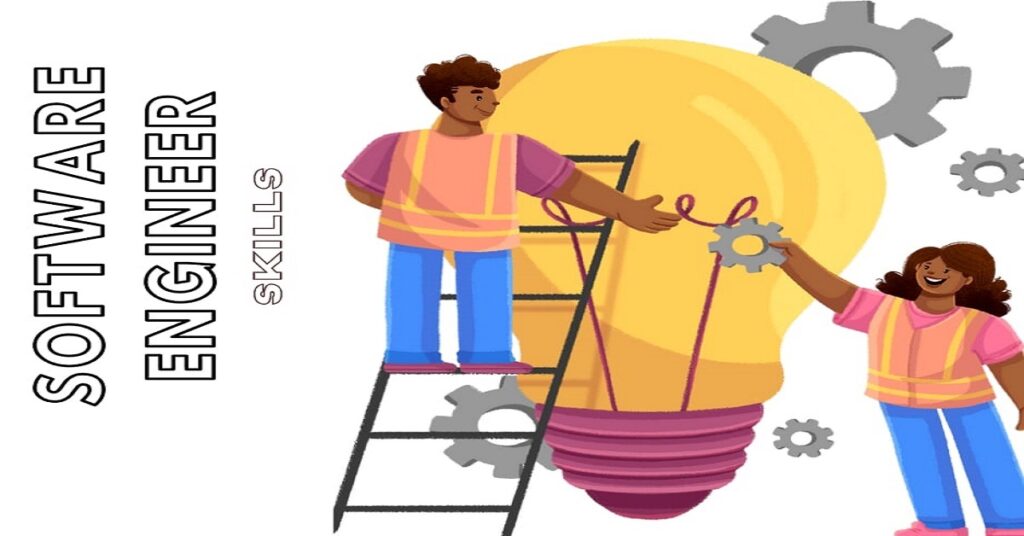A Software engineers have vast career opportunities in top software companies, both as fresh graduates and experienced professionals. Companies like Infosys, Capgemini, Microsoft, Amazon, and many others actively hire software engineers for various positions. Read more career blogs at college49.
Who is a Software Engineer?
A software engineering professional is an individual who embarks on the journey of designing, developing, testing, and maintaining software applications. Drawing upon engineering principles and various programming languages, software engineers craft software solutions tailored to meet the needs of end users.
According to Techopedia, software engineering embodies the process of comprehending user requirements, and subsequently formulating, constructing, and evaluating end-user applications that diligently fulfill those requirements through the utilization of software programming languages. It encompasses the application of engineering principles to the realm of software development. Unlike simple programming, software engineering caters to the creation of larger and more intricate software systems, which serve as indispensable components for businesses and organizations..
what does a Software Engineer Engineer do?
A software engineer undertakes the responsibility of analyzing user requirements and subsequently designing, building, and testing applications that fulfill those requirements. Software engineers shoulder various tasks, including:
- Collaborating with systems analysts, engineers, programmers, and other stakeholders to design systems and gather relevant information regarding project limitations, capabilities, performance requirements, and interfaces.
- Modifying existing software to rectify errors, facilitate adaptation to new hardware, and enhance overall performance.
- Evaluating user needs and software requirements to determine the feasibility of designs within time and budget constraints.
- Engaging in discussions with customers to ascertain software system design and maintenance requirements.
- Coordinating software system installations and overseeing related equipment to ensure adherence to specifications.
- Developing, modifying, and enhancing software systems using scientific analysis and mathematical models to predict and evaluate the outcomes and implications of those designs.
- Overseeing software system testing, validation procedures, programming, and documentation.
- Analyzing information to determine computer specifications, layouts, and necessary peripheral equipment modifications.
- Supervising teams of programmers, technologists, technicians, and other engineering and scientific personnel.
- Assessing reporting formats, associated costs, and security requirements to determine hardware configurations.
- Establishing system performance standards.
- Providing training on the usage of new or modified equipment.
- Managing the storage, retrieval, and manipulation of data for the analysis of system capabilities and requirements.
- Specifying power supply requirements and configurations.
- Recommending environmental control equipment, including dust control, temperature regulation, and humidity levels, during system installations.

What Do Software Engineer Skills Have?
Here is a compilation of skills and abilities possessed by proficient software engineers:
- Proficiency in analyzing intricate technical information
- Aptitude for assessing business requirements and evaluating their impact on existing database architecture
- Strong research skills
- Excellent problem-solving capabilities
- Extensive experience in software application development
- Familiarity or experience with JavaScript, Linux/Unix, Perl, Shell, Java, Ruby, PHP, Python, Hands-On SQL, Microsoft ASP.NET MVC, Web API, Node.js
- Competence in working with source code and version control systems
- Familiarity with UI Toolkits and frameworks
- Leadership skills and the ability to deliver complex software systems
- Effective project management skills, with the ability to handle multiple projects and meet deadlines
- Passion for creating captivating user experiences
- Support and assistance to fellow engineers in development and testing processes
- Experience with Ruby on Rails
- Proficient knowledge of Java
- Strong problem-solving abilities, coupled with excellent oral and written communication skills
- Thorough understanding of computer architecture, operating systems, and data structures
- Adaptability to fast-paced, dynamic environments without being overwhelmed
- Capability to translate requirements into design concepts and entity relationship diagrams (ERDs)
- Proficiency in troubleshooting and debugging
- Familiarity with software engineering best practices
- Ability to work effectively both independently and as part of a team, including Agile Scrum teams
- Working knowledge of C, C++, and C#
- Proficient in writing precise and comprehensive technical specifications and documentation.
What is the Eligibility Criteria for a Software Engineer?
To pursue a career in software engineering, candidates must meet certain eligibility criteria. Here are the key requirements:
Qualification: Candidates should have completed their Class 12th with a Science stream.
Compulsory Subjects: Candidates are required to have studied Maths, Physics, and Chemistry as compulsory subjects during their Class 12th education.
Qualifying Marks: The minimum qualifying marks may vary from institute to institute. Many institutes generally require candidates to have scored at least 60% or above in their Class 12th examinations.
Entrance Exam: It is mandatory for candidates to qualify in the entrance exam conducted or accepted by the institute they wish to join. The specific entrance exam and its qualifying criteria will depend on the policies and requirements of the respective institutes.
What is the qualification of a Software Engineer?
To embark on the path of becoming a software engineer, aspiring candidates need to fulfill certain qualifications. Here are the key requirements:
- Education: Aspiring candidates must successfully clear their Class 12 board exams from a recognized board with a minimum score of 55% or above. It is mandatory to have studied Physics, Chemistry, and Mathematics as the subject combination.
- Entrance Exams: Candidates aspiring to pursue undergraduate or postgraduate courses in software engineering must clear relevant entrance tests. These exams include JEE Mains, JEE Advanced, VITEEE, BITSAT, and others. Clearing these entrance exams is a prerequisite for admission to renowned institutions offering software engineering programs.
- Bachelor’s Degree: For those interested in pursuing postgraduate courses in software engineering, it is essential to hold a bachelor’s degree in software engineering, computer science, or a related field. The bachelor’s degree provides a strong foundation and in-depth knowledge necessary for advanced studies and specialization in software engineering
What are the courses for a Software Engineer?
Discover various programs in the field of software engineering, along with the admission process and renowned institutions associated with each program.
| Course Name | Program Type | Duration |
|---|---|---|
| BTech Software Engineering | Undergraduate Degree | 4 years |
| MTech Software Engineering | Postgraduate Degree | 2 years |
| ME Software Engineering | Postgraduate Degree | 2 years |
| MSc Software Systems | Postgraduate Degree | 2 years |
| PhD Software Engineering | Doctoral Degree | 3 years |
| Diploma in Computer Programming and Software Engineering | Diploma | 2 – 3 years |
| Diploma in Software Engineering | Diploma | 2 years |
| Online Software Development Courses | Certification | Less than 6 months |
| Python Online Courses | Explore Here! | |
| Java Online Courses | Explore Here! | |
| SQL Online Courses | Explore Here! | |
| Online Course in Software Engineering | Provider | Fees |
| Mastering Data Structures & Algorithms Using C and C++ | Udemy | INR 455 (INR 3,499) 81% off |
| Master the Coding Interview: Data Structures+Algorithms | Udemy | INR 455 (INR 3,499) 81% off |
| Kubernetes Certified Application Developer (CKAD) with Tests | Udemy | INR 455 (INR 3,499) 81% off |
| Professional Certificate in Computer Science Essentials for Software Development | Edx | INR 44,442 (INR 49,380) |
| Software Engineering: Introduction | Edx | INR 10,356 (Audit Track Free) |
| IBM DevOps and Software Engineering Professional Certificate | Coursera | INR 3,177 (1 Month) |
| INR 6,355 (3 Months) | ||
| INR 9,532 (6 Months) | ||
| Applied Software Engineering Fundamentals | Coursera | INR 3,177 (1 Month) |
| INR 6,355 (3 Months) | ||
| INR 9,532 (6 Months) | ||
| Java Programming and Software Engineering Fundamentals | Coursera | INR 3,992 (1 Month) |
| INR 7,984 (3 Months) | ||
| INR 11,977 (6 Months) | ||
| Executive Postgraduate Program in Software Development – Specialization in Full Stack Development | IIIT-B | INR 2,49,000 |
| Full Stack Software Development Bootcamp | upGrad | INR 1,77,000 (1,50,000) 15% OFF (Job Guarantee) |
| INR 1,30,000+INR 47,000(Non-Refundable) (Pay After Placement) | ||
| Advanced Certification in Software Engineering for Cloud, Blockchain and IoT | IIT Madras via Great learning | INR 2,50,000 |
| Advanced Certificate Program in Full Stack Software Development | E&ICT IIT Roorkee | INR 2,00,000 |
| Mastering the Software Engineering Interview | Class Central | Free Online Course (Audit) |
Certification Courses in a Software Engineering
| Certificate Name | Provider | Fees |
|---|---|---|
| Mobile App Development with React | Coding Elements | Free |
| Programming for Everybody | Coursera | Free |
| Advanced Certification in Software Engineering | IIT Madras | INR 2,00,000 |
| The Complete Software Engineering from Basics to Advanced | Udemy | INR 1,299 |
| Introduction to Software Testing-Revised | Alison | Free |
| Certificate Course in JAVA Programming | CDAC Pune | INR 600 |
| Certificate Course in Web Application Technologies (ASP.Net with C#) with Project | NIELIT Delhi | INR 6,800 |
What are the different types of Software Engineers?
In the job market, there are various types of software engineer roles available. Let’s explore a few of them:
- Web Developer.
- Business Information Analyst
- Computer Systems Analyst
- Information Security Analyst
- Exploring Diverse Software Engineer Roles.
How to Become a Software Engineer in India?
The subsequent step involves pursuing a bachelor’s degree. This crucial undertaking should center around the fields of computer science, computer engineering, or information technology. Aspiring software engineers will find that a bachelor’s degree serves as the foundation for most software engineering positions. By successfully attaining this academic milestone, individuals demonstrate their mastery of advanced software engineering training.
Once the academic voyage is complete, the next phase entails seeking entry-level employment opportunities. Software engineers are in high demand across various industries, both within and outside the realm of information technology. The application process commences with the preparation of a comprehensive resume and portfolio, showcasing one’s skills and accomplishments. Furthermore, it is imperative to continuously update and augment one’s knowledge and proficiencies, enabling individuals to apply for positions at reputable organizations operating within the field.
Furthermore, consider the merits of partaking in an internship. This experiential learning opportunity serves as a catalyst for professional growth in the software engineering realm. Internships provide firsthand exposure to the real-world challenges and intricacies of the industry, while concurrently fostering valuable connections with industry professionals. In certain instances, internships may even metamorphose into part-time or full-time employment. It is worth noting that numerous bachelor’s degree programs mandate the completion of internships. However, for those programs that do not, aspiring software engineers can actively seek out internships independently subsequent to obtaining their degrees.
Aspirants seeking further academic prowess can explore the pursuit of a master’s degree. The acquisition of a master’s degree augments an individual’s skill set, endowing them with additional proficiencies that may not have been covered during their undergraduate studies. Although not obligatory, a master’s degree can provide a competitive advantage when vying for higher-level positions at esteemed organizations. Moreover, those with aspirations of assuming managerial roles can consider pursuing an MBA (Master of Business Administration) degree subsequent to their graduation.
Another viable option to enhance one’s qualifications entails obtaining certifications or diplomas. While formal academic qualifications fulfill the foundational requirements for securing a software engineering job, many graduates yearn to cultivate specialized skills that align with their career aspirations. Certifications bestowed by reputable authorities serve as tangible evidence of one’s technical prowess in specific facets of software engineering. Additionally, postgraduate diploma courses offer avenues for further expanding one’s knowledge and expertise. Popular postgraduate certification programs include:
- PG Diploma in Cyber Security
- PG Diploma in Cloud Computing
- PG Diploma in Full-Stack Development
Attending conferences and participating in workshops also serves as a valuable means of skill augmentation. Given the dynamic nature of the technology landscape, software engineers must continually remain updated on emerging innovations. By actively engaging in domain-specific conferences, individuals can gain insights into novel products and industry trends. Furthermore, conferences provide a platform for networking and knowledge exchange among software engineering professionals. Workshops offer hands-on learning experiences, enabling participants to grasp industry best practices and relevant workflows.
1. What is the role of a software engineer?
Software engineers design, develop, and build computer software, including applications and systems, by writing code and using various programming languages and tools.
2. What educational background is required to become a software engineer?
Most software engineers have a bachelor’s degree in computer science, software engineering, or a related field. However, practical experience and certifications can also be valuable in this profession
3. What skills are important for a software engineer?
Essential skills for software engineers include programming proficiency, problem-solving abilities, analytical thinking, teamwork, communication skills, and adaptability to new technologies and frameworks.
4. What programming languages should a software engineer know?
The choice of programming languages depends on the specific requirements of the job, but popular languages include Java, Python, C++, JavaScript, and Ruby.
5. What is the software development life cycle (SDLC)?
SDLC is a process that outlines the stages involved in developing software, including requirements gathering, design, coding, testing, deployment, and maintenance.
6. What is the difference between front-end and back-end development?
Front-end developers focus on creating the user interface and user experience, while back-end developers work on server-side programming and database management for the functionality of applications.
7. What is agile software development?
Agile is an iterative and collaborative approach to software development that emphasizes flexibility, adaptability, and continuous improvement throughout the development process.




